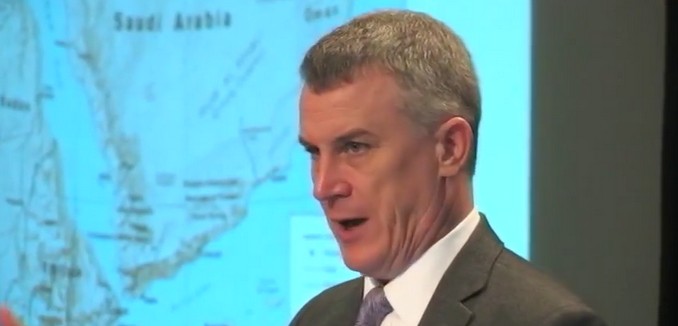In testimony (.pdf) yesterday before the Senate Foreign Relations Committee, Michael Doran, a Senior Fellow at the Hudson Institute, recommended new sanctions against Iran to ensure that the United States has sufficient leverage ahead of the June deadline to conclude negotiations over Iran’s nuclear program. Such leverage has been diminished, Doran argued, by increased cooperation with Iran in other matters, such as the fight against the Islamic State of Iran and Syria (ISIS).
Doran identified trends in American policy towards the Middle East, and the implications of this policy for its allies. The first trend is that “our allies perceive increased coordination” between the United States and Iran, as evidenced recently by Iranian airstrikes on ISIS in Iraq, which could not have been carried out without coordination with the United States. Despite this cooperation, there has been no “change in the malign Iranian policies that, historically, have deeply threatened America’s allies.”
Another trend has been the reluctance the administration has displayed in “build[ing] up the Syrian opposition in ways that might threaten the Assad regime.” The administration has also taken to insulting traditional American allies. Vice President Joe Biden recently said explicitly, “our allies are the problem.” Finally, Doran notes that America’s retreat in the nuclear negotiations with Iran “confirmed our allies’ perception that American resolve is flagging.”
Doran cited two implications of these trends:
First, our allies’ alienation from the president’s regional strategy is undermining his ability to build an effective coalition against ISIS. It is a hard fact of life that we cannot win this conflict without developing Sunni allies. On the ground we need Sunni troops, trusted by the local population, who are capable of holding the cities and towns from which we will drive ISIS. In the region more broadly, we need a committed coalition of Sunni states. However, so long as we are aligned with Iran and its allies, who have a well-deserved reputation for sectarian murder, we will fail to attract Sunnis to our banner. …
The second reason for caring about our allies’ concerns relates directly to the nuclear question. It is a grave mistake to assume that the Iranian position in the nuclear negotiations is disconnected from everything else that is happening in the Middle East. The demoralization of our allies emboldens Ali Khamenei. It is just as clear to him as it is to the Saudis and the Israelis that the Obama administration has prioritized the conflict with ISIS over the containment of Iran. The five trends in American policy that deeply unsettle our allies have the effect of providing the Iranian leader with reassurance. They indicate, among other things, that his intransigence is unlikely to provoke President Obama into ratcheting up economic sanctions, let alone to contemplate military action.
In the end, Doran recommended two steps for President Obama to take to restore leverage in negotiations with Iran and to reassure American allies.
The first step toward regaining that leverage is for the President to sign a new sanctions bill that will demonstrate to the Iranians, and to our allies in the region, that our patience is not endless. The second step is to dispel our allies’ perception of a silent partnership with Iran. That step begins with, but is by no means limited to, building up an effective opposition to the Assad regime in Syria.




